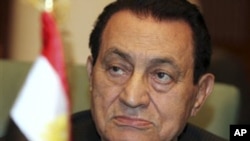Egypt is set to hold presidential elections toward the end of 2011, but so far no one has officially entered the race. Aides say President Hosni Mubarak will seek a sixth six-year term, but the spotlight is also on his son, Gamal, a rising star in the ruling National Democratic Party widely seen as being groomed for the post.
Elections for Egypt's parliament in 2010 have left many here with a profound sense that the National Democratic Party is here to stay, no matter what. After voting roundly condemned by human rights and electoral groups as riddled with fraud, the outcome has left the NDP with almost complete legislative control, a power critical to setting the terms of the presidential race.
Speculation is strong that President Mubarak, 82, and with health problems, may be preparing the way for son Gamal, a 47-year-old former London investment banker, to come to power. On the streets, such a scenario is ridiculed as "hereditary democracy," the kind perceived in such nearby states as Syria, where President Bashar al Assad came to power after the death of his father.
But the dynamics may be different in Egypt. Media publisher Hisham Kassem says the military and security backbone of the state is committed to a system, not a family or clan, particularly not to the man Kassem refers to by his Westernized nickname.
"If anybody thinks the generals, once Mubarak senior is gone, the generals are going to sit there and smile and, you know, let little Jimmy become the next president, this is really unrealistic," said Kassem.
Kassem is among those who believe any succession to President Mubarak could be by another general, most likely General Omar Suleiman, Egypt's director of intelligence. Suleiman, who heads one of the more pervasive security services in the Arab world, is also known for his diplomatic efforts including, so far in vain, to reconcile the bitterly split Palestinians.
Another possible contender is opposition figure and former U.N. nuclear chief Mohamed elBaradei. The co-winner of the Nobel Peace Prize has said he will run if the constitution is amended - an unlikely scenario given the domination of the NDP.
Even elBaradei's plan to collect signatures from the public to demand change could prove daunting, in part because they can be ignored if not backed up by public demonstrations, a challenge under Egypt's strict security laws and their consequences.
"The biggest demonstration now in Egypt doesn't exceed 3000 people," said Kassem.. So, it's not the street with him. They are collecting signatures. Collecting signatures is one thing, and getting people to go out on the street is another. The bulk of people who are signing will not go out in a demo."
A question being asked repeatedly among opposition movements is what, if any, is the tipping point for a real change in government, away from the one they argue has led the region's once-major power into stagnancy.
Independent political activist Ahmed Salah is among those who believe the situation is not as stable as many in the West believe, but says grass roots political change is still a long way off.
"Everything is deteriorating constantly and people are building more and more pressure that would come out in waves of violence, that would be sectarian, or football, because people do not put this violence yet in something political because they are under a combination of despair and fear," said Salah. "They are so afraid because they do anything political they go to hell."
That hell, for Salah and thousands of others of opposition figures, is the well-documented abuses suffered by those detained in Egypt's prison system.
For others, like publisher Kassem, the tipping point would be the government's mishandling of a massive natural disaster or an economic meltdown. But short of that, he thinks the chances are good that whoever is in power at the end of 2011, the situation in Egypt will likely remain very much the same.




